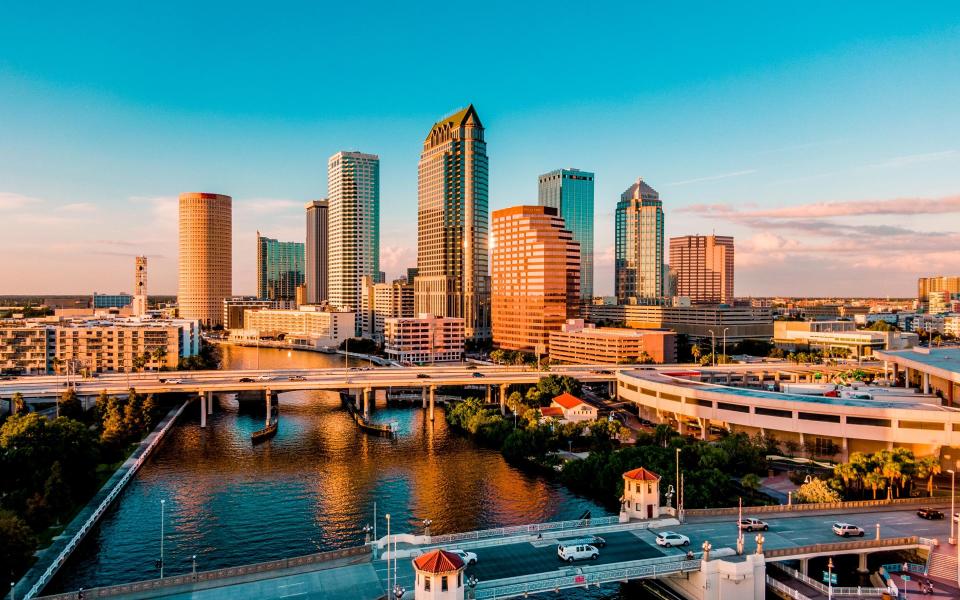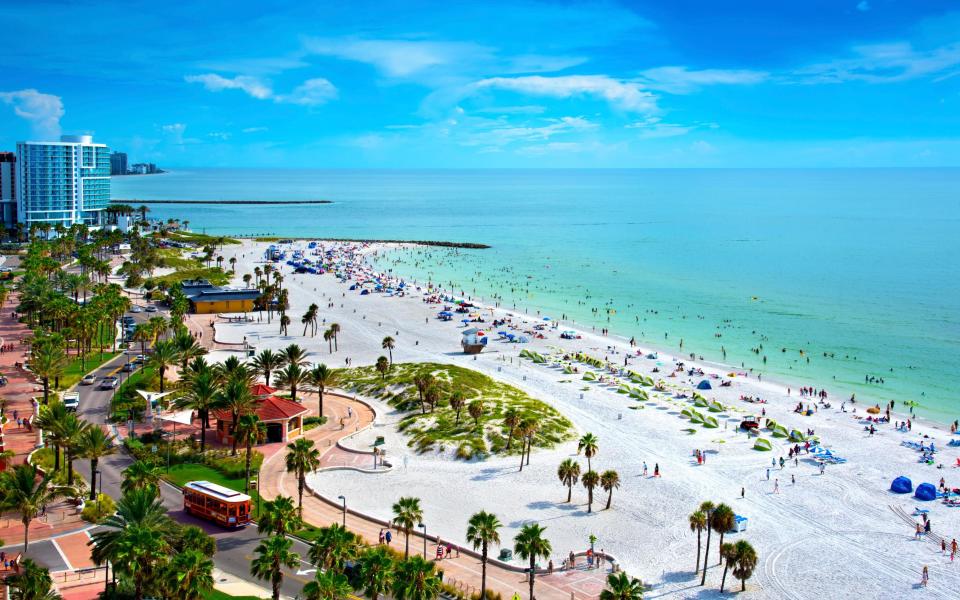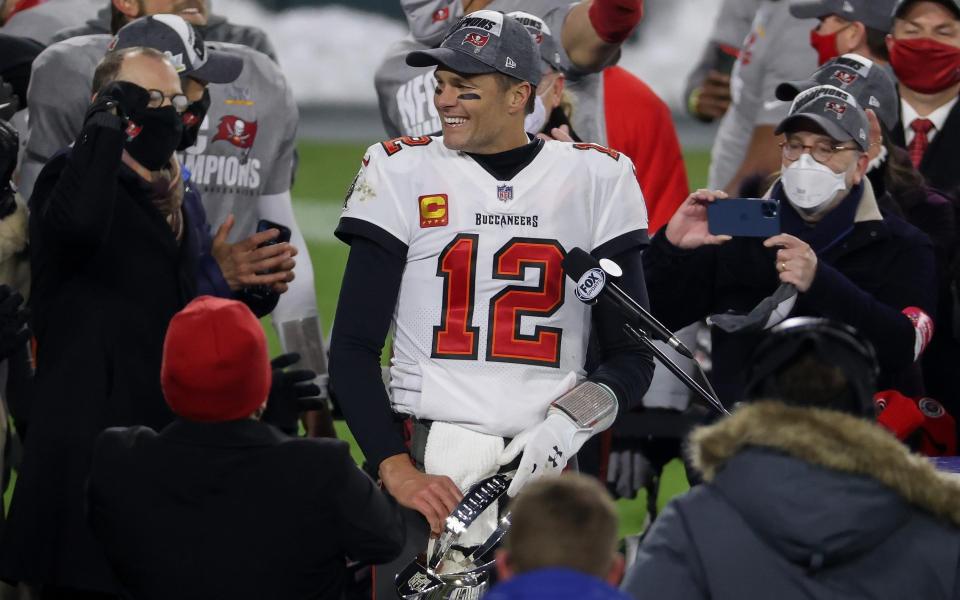How Tampa is attempting to host the Super Bowl in the time of Covid

If you were to subscribe to the idea – to lift the relevant line from King Lear – of meddlesome gods who “kill us for their sport”, then you might look to this weekend’s Super Bowl as a classic case of divine mischief. It is no wild exaggeration to say that, even before it starts, what will play out in the Florida sun on Sunday may already be the most remarkable game in the history of an event that usually comes soaked in hyperbole.
Here will be a collision between the Kansas City Chiefs and the Tampa Bay Buccaneers that, by dint of random occurrence, will take place in the latter’s Raymond James Stadium – the first time, in almost six decades of the contest, that a team has qualified to play what is the biggest fixture in US sport in their home arena (the venue is selected several years in advance). Better still, these home-town heroes will be led by a 43-year-old quarterback, Tom Brady, who – for all his many achievements in a game in which he is by far the most famous contemporary figure – has been widely decried as past his best.
It reads like an against-all-odds movie script, but for the fact that – and here is where the gods may have been wreaking their wry havoc – it will take place during a pandemic that restricts what is possible, and has made planning for the fixture akin to chasing the wind.
Cocooned in his office in the middle of a frenetic week, Santiago Corrada – the president and CEO of the local tourism authority Visit Tampa Bay – nods at this suggestion. “We bid to stage this Super Bowl back in 2015,” he says. “So we did a lot of planning before we were even awarded the game.”

Initially, Tampa failed – when Los Angeles was picked as the 2021 host. But when it became apparent that its new SoFi Stadium would not be ready in time, the Florida city got the call (in May 2017). “So obviously, from then, it was fast-forward,” Corrada explains. “And right now, we’re in ‘execution mode’. We’re trying to make sure everything goes well. The last few days have been a fury of activity.”
Of course, “everything going well” is a comparative concept in the Covid era. Ordinarily, Corrada would expect a Super Bowl host to be crammed to the seams. Particularly one which exists in so splendid a location. Tampa is not the most famous of Florida’s tourist cities – Miami, Orlando and Fort Lauderdale all see to that. But it sits very pretty, on the west flank of the peninsula – not quite on the Gulf Coast, thanks to the broader waters of the eponymous Tampa Bay, which has long protected it from the open sea, but close enough for it to be a destination for year-round sun and sand. Just, not entirely at present.
“I don’t think we will see anything close to normal visitor numbers this week,” Corrada muses. “But I’m hoping that, for the time being, we will get our hotel occupancy numbers up, and our revenue numbers up. In the past [Tampa last hosted the game in 2009], we’ve seen the Super Bowl spread out – because we don’t have a big enough inventory of hotel rooms in the city. So we’ve seen guests staying in some of the surrounding areas. This time, I think we’re getting a heavy concentration of visitors near to where the action is.”
He says that the city’s hotels had a 53 per cent occupancy rate during January – down 20 per cent on the same (pre-pandemic) month in 2020. “And our Super Bowl week occupancy rate back in 2009 was a little over 86 per cent. So we’ll see if we manage to grow January’s 53 cent into something higher. We’ll know about a week after the game.”

Away on the opposite side of the Bay, Steve Hayes – president and CEO of the Visit St Pete/Clearwater tourism area –has seen a similar dip in footfall. “At this time of year, our hotels are usually running at 80 or 90 per cent occupancy,” he says. “Right now, we’re at about 50 per cent. If we could just get that up to 70-80 per cent, that would be above par.”
He is, however, trying to err on the bright side. “We’re looking at the match as a case of ‘gosh we really need this’,” he explains. “I’m taking the standpoint that, OK, it’s not what we would have expected when we were awarded the event – but it’s what we have. If you look at the visibility we have at the moment, around the world, and around the United States – then that’s what we need right now. It’s still not what we would expect from a Super Bowl year, but it’s better than if we were just having our winter season at present.”
Some might say that the Super Bowl being booked into a Florida city during a pandemic is a fortuitous thing in itself –in that, with social-distancing rules observed, the state’s climate allows for outdoor events that would be impossible in February in colder regions.
“Yes, the weather here tends to co-operate,” Corrada laughs. “In other parts of the country, you might not be able to do all these outdoor things, and stay socially distant, and still enjoy the festivities. But the weather here usually works with us, not against us.”
However, there is more to the game being able to go ahead than blue skies and bright horizons. Florida’s approach to Covid-19 is also – for better or for worse – a factor. The state has suffered heavily at the hand of the virus. As of the start of this month, it has had 1.7 million confirmed cases, and 27,129 fatalities – the fourth highest state death toll, and a grim number which accounts for six per cent of the country’s total losses (443,355, at time of writing). But in spite of this –and perhaps as a contributor to it – it has kept its economy up and running. Although all but essential services were shut down in the immediate panic of March 2020, the state has changed tack since September – when governor Ron DeSantis, a staunch ally of former President Trump, pared back local restrictions, removing fines for mask violations, and permitting restaurants to open fully.
Everyday life has largely continued – and certainly enough that there has never been a question of the Super Bowl not going ahead as planned. “We’ve stayed open for business,” Corrada adds. “That really does help. It would probably have been difficult to have this Super Bowl as originally scheduled in California – based on the lockdown rules over there. I think this is a case of the right time and the right place – and the right team.”

True, there is plenty that is not happening. Taste Of The NFL – a gourmet extravaganza that is normally a highlight of the week before the match, with chefs from football cities across America preparing delights for paying guests – is only taking place online. But there is much that is going ahead. The NFL Experience – a temporary exhibition-cum-theme-park which takes visitors through the history and legends of the sport, and allows them to throw and kick a few balls in person – is currently dominating Tampa’s Riverfront Park. And an NFL flag (non-contact) game of football is due to be staged on Clearwater Beach – although, in deference to the crisis, the match will not be accessible to the public.
The main event will be a similar compromise. The Raymond James Stadium has 65,618 seats. It will fill only a third – 22,000 – of them. This will make it, by cruel default, the least attended Super Bowl ever – although, in a noble gesture, 7,500 of the tickets have been given to health workers. Nonetheless, as anyone who attended one of the Premier League (round-ball football) fixtures in the UK in December – when between 2,000 and 4,000 fans were briefly allowed back into the division’s mega-stadia – will know, this makes for a bizarre half-atmosphere; the cheers echoing around the spaces in the stands.
It is a considerable shame that the Super Bowl will not be played to full-volume roar. It is implausible to describe anything in top-level American football as “a fairytale”. In a sport fuelled by money and a devoted worldwide fanbase, most games are examples of Goliath vs Goliath; David and his sling never get a look-in. But there is still a definite romance to the Tampa Bay Buccaneers playing this showpiece. Although the team won the Super Bowl as recently as 2002, its 2020-2021 incarnation was not expected to feature in the season’s grand finale. And the signing of Brady last March was widely regarded as little more than an opportunity for the superstar who won six Super Bowls in two dazzling decades with the New England Patriots to enjoy a gentle lap of honour in the sunshine.
Writing for this newspaper, Thom Gibbs argues that Brady’s “status as the greatest ever is no longer a debate”. He adds: “Consider the following 11 NFL teams: Titans, Texans, Saints, Lions, Jets, Jaguars, Chargers, Cardinals, Browns, Bengals, Panthers. Between them they have reached nine Super Bowls in their history. Brady alone has been to 10.”

That the Buccaneers are the first team to reach a Super Bowl in their own arena only amplifies the misty-eyed talk of destiny. That said, lack of precedent is no guarantee of victory. The Kansas City Chiefs are the reigning champions, and familiar surroundings might easily equate to extra pressure rather than home comforts for their opponents. And while there may be no prior example in American football, this situation has occurred in the corresponding blue-riband event in round-ball football, the Champions League Final (or the European Cup Final, as it was known until 1992). In 1984, Roma faced Liverpool in their own Stadio Olimpico, and in May 2012, Bayern Munich “welcomed” Chelsea to the Allianz Arena that they call home. On both occasions, the out-of-towners triumphed.
Corrada says that, whatever the sporting outcome, the match is an enormous boon for the area – and is less a single game, more an American carnival. “Walking around town, I’ve seen a lot of team jerseys that are neither the Buccaneers or the Chiefs,” he says. “I’ve seen a fair few Chicago jerseys, New York jerseys, New England jerseys, Dallas jerseys. You get lots of fans who are also fans of the Super Bowl itself. It’s not like any other event. It’s a week-long festival. Most people who come to a Super Bowl host city do not have a ticket to the game. They are coming to enjoy the ambience and the environment.”
Hayes concurs. “Super Bowl folks love being around the big game,” he explains. “Even if they’re not at the match itself, they want to be part of what happens. Right now, a lot of them are saying: ‘I’m going to go. I’m going down to Florida. I’m going to go enjoy the beaches.’ Especially if they live in the Midwest or northeast, and they’re buried in snow.”
He admits to seeing a down-side to there being a “home team”. “Normally, in terms of tourism, you wouldn’t want that,” he says, “because you only have one set of supporters travelling in.” However, he has been caught up in the excitement. “There is a real sense of local pride in the Bucs making it,” he adds. “It’s a huge shot in the arm for everybody.”

He also expects the match to help spark a post-pandemic tourism boom. “Everything I’ve seen, and everything that I’ve read, tells me that people want to travel again,” he continues. “As soon as somebody raises the flag and says ‘the borders are open’, the destinations that are ready – and can say ‘hey, this is the best place to come to” – are going to win in this game. I think that that’s where we are really going to benefit. Because we are getting lots of great exposure from the Super Bowl being hosted here on Tampa Bay.”
Corrada is of the same optimistic mindset. “I’m looking at 2021 as a year of hope,” he grins. “We’re starting it with a Super Bowl, and I hope we can continue that momentum.”
He is loath, though, to estimate the size of any subsequent tourism bounce. “We’ll have to wait and see what happens," he adds, with another laugh. “My crystal ball cracked back in February and March last year. I’ve gotten out of the predictions business since then.”


